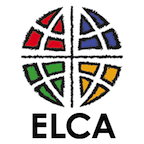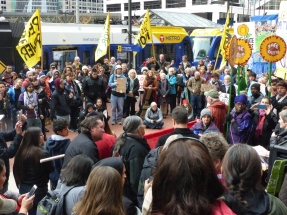This is the first in a series of blogs exploring how religious communities who are Standing with Standing Rock are reviewing their investments for ties to the Dakota Access Pipeline. Will their investments change?
 The Evangelical Lutheran Church in America (ELCA) has taken a formal position supporting the Standing Rock Nation and its opposition to the Dakota Access Pipeline (DAPL). It also is flexing its financial muscle, looking at how its investments are supporting DAPL and asking tough questions of Enbridge, a major DAPL investor.
The Evangelical Lutheran Church in America (ELCA) has taken a formal position supporting the Standing Rock Nation and its opposition to the Dakota Access Pipeline (DAPL). It also is flexing its financial muscle, looking at how its investments are supporting DAPL and asking tough questions of Enbridge, a major DAPL investor.
There is a growing effort to get individuals and institutions to divest from companies tied to DAPL. Divesting is one option outside of the political arena where people can make a difference and vote their values with their money.
The ELCA is a large institutional investor, socking away money for retirement plans for its many employees. It’s the kind of big investor that can influence a corporation. As of the third quarter of 2016, the ELCA had $7.8 billion managed by Portico Benefit Services. (Of that, $6.4 billion was in retirement plans).
The ELCA’s investments include Enbridge Inc. “whose U.S. vehicle, Enbridge Energy Partners, owns a 27.5% interest in the Dakota Access Pipeline project,” according to Rev. Jeff Thiemann, Portico’s President and CEO. According to a statement Rev. Thiemann made to Healing Minnesota Stories on Dec. 8:
Portico just this week, along with several other investors, submitted a shareholder resolution to Enbridge Inc. [regarding DAPL] … This resolution calls on Enbridge to prepare a report to shareholders detailing the due diligence process used by Enbridge, its affiliates, and subsidiaries to identify and address social and environmental risks, including Indigenous rights risks, when reviewing potential acquisitions.
Martin Luther and Social Responsibility

The Lutheran Church’s history is rooted in advocating ethical business practices. For that story, we turn to Jacob Fugger, a medieval banker in Germany who had a big influence on Luther. A book review published in the Economist titled: “The Richest Man Who Ever Lived: The Life and Times of Jacob Fugger” provides the background.
[Fugger and a Habsburg partner] began to sell indulgences (a forgiveness of sins, which provided, for a fee, a short cut to heaven), splitting the proceeds with Pope Leo, who used the cash to build St Peter’s Basilica. In 1517 Martin Luther was sufficiently outraged by this scheme that he wrote the “95 Theses” that damned Rome, sparking the Protestant Reformation.
The ELCA’s current boycott policy notes that “Martin Luther himself called for a boycott of the Fuggers, a merchant banking company.”
Divestment Advocates Currently Focus on Banks
So far, divestment advocates have focused on banks such as Wells Fargo and U.S. Bank that are financing DAPL. The movement seems to have started with research by Food & Water Watch. Its work got picked up by Yes! Magazine, Democracy Now, and other outlets.
Notably, two Norwegian financial institutions already have pulled their investments — DNB (the largest bank in Norway) and Odin Fund Management. (See blog.) The Minneapolis City Council is reviewing its investments in financial institutions with ties to projects such as DAPL, according to a report in the Star Tribune. The city of Seattle is reviewing a similar proposal.
It appears the ELCA is focusing its investment review on Enbridge and not the finance industry. (Healing Minnesota Stories has requested clarification from the ELCA and will update this blog when we get it.)
Standing with Standing Rock
The ELCA has taken a strong position on Standing Rock. On Nov. 14. ELCA Presiding Bishop Elizabeth Eaton wrote:
… I believe that we are called as a church to support the Standing Rock Sioux Tribe: to stand with the Tribe as they seek justice, to encourage our congregations to pray for them and to offer material support, and to examine the racism inherent in our system that contributes to the current crisis. As promised in our resolution repudiating the doctrine of discovery, we will listen to tribal leaders and respect their wisdom.
We will lend our presence when invited, our advocacy when requested, the resources of our people when asked, and our prayers, friendship and repentance at all times.
So we turn to the question: Does that advocacy include divesting from businesses involved with the pipeline? As responsible stewards of retirement resources, the ELCA has to be financially prudent. Yet at what point do the negative impacts of these investments become so overpowering that they merit divestment?
Shareholder Resolution to Enbridge
The ELCA has submitted this shareholder resolution to Enbridge. The resolution notes that Enbridge acquired its stake in DAPL on August 2, 2016. That was five days after the Standing Rock Nation filed a lawsuit challenging DAPL’s approval, and eight days before the beginning of the conflict between DAPL security forces and the Water Protectors. According to the resolution:
At the time of the agreement to acquire an interest in the DAPL Enbridge should have been aware of the Indigenous rights and environmental risks of the project. …
The resolution concludes as follows:
That the Board of Enbridge Inc. prepare a report to shareholders, at reasonable cost and omitting proprietary information, detailing the due diligence process used by Enbridge, its affiliates and subsidiaries to identify and address social and environmental risks, including Indigenous rights risks, when reviewing potential acquisitions. Such a report will consider:
- Which committees, departments and/or managers are responsible for review, oversight and verification;
- How Indigenous rights and concerns are identified and assessed;
- How environmental and human rights risks are identified and assessed;
- Which international standards are used to guide the company’s human rights and environmental due diligence procedures; and
- How this information informs and is weighted in acquisition decisions.
This resolution is a first step in holding Enbridge accountable for the impact of DAPL, but it is not divestment. Shareholder actions like this can take a long time to get results.
Healing Minnesota Stories has sought clarification from the ELCA on the timeline for this process and how further action might unfold. We will update this blog when we get more information.
ELCA Corporate Social Responsibility Policy
Portico plays a key role in implementing the church’s corporate social responsibility ministry and policies. According to Rev. Thiemann’s statement, the ELCA has three key ways to help bring corporate behavior in line with ELCA social policies and teachings.
- Influencing corporate decisions via shareholder advocacy, dialog, and proxy voting across all its funds.
- Screening out from ELCA social purpose funds companies in conflict with the ELCA’s mission
- Positive investing via the ELCA social purpose funds in companies that can deliver financial returns and positive social impact in line with the ELCA’s mission
The ELCA has not provided specific guidance to Portico and other ELCA investors on how it could support the Standing Rock Nation through the investment screening process, Thiemann said.
The following ELCA documents and analysis provide important resources for Lutheran who want to raise this issue with your church leaders.
The ELCA has numerous policies and papers on Corporate Social Responsibility. They guide the church’s investment strategy, including investment screening, shareholder advocacy and reviewing investments “to ensure that people are treated fairly and with dignity and to create sustainable communities.”
The ELCA will not invest in firms profiting from alcohol, tobacco, gambling, private prisons, military weapons or pornography, according to these policies. It currently is working to develop a “human rights social criteria investment screen.” Further, the ELCA has issue papers on everything from Climate Change and Violence in our World to Extractive Industries and Environmental Topics. The ELCA issue papers lay out guidelines for which the ELCA will ask corporations for reports or explanations for their actions, such as the shareholder resolution it sent to Enbridge.
Comparing ELCA Statements to What is Happening with DAPL
The issue papers indicate that the ELCA should have strong reservations about its investments in Enbridge based on Enbridge’s ownership in DAPL. For instance, the ELCA issue paper on Violence says:
… all of society —including the corporate world — must find creative ways towork toward peace and nonviolence. … The call to corporations is to recognize their role in the problem and to work to become part of the solution.
And related, the ELCA issue paper on Extractive Industries says:.
The ELCA also is concerned that this sector [extractive industries] is often the venue for environmental degradation, the impingement upon indigenous lands, and a lack of respect for human rights….

Note: Violence against the Water Protectors and a lack of respect for their human rights has been ongoing. According to observers: DAPL security has used attack dogs against the Water Protectors. Law enforcement has sprayed fire hoses against them in freezing temperatures, as well as using tear gas and rubber bullets. Law enforcement has taken sacred items, including pipes and staffs from Native people. People at the camp have lived under intense and ongoing military surveillance and harassment. This includes shining industrial floodlights onto the camp at night to deprive people of sleep and flying helicopters and airplanes overhead at all hours of the night. People have suffered inhumane treatment after arrest, including cavity and strip searches and having piercings cut off with bolt cutters.
Contrast this to the behavior of the Water Protectors. Bishop Ann Svennungsen of the ELCA’s Minneapolis Area Synod wrote the following: “In my visit to Standing Rock I was overwhelmed by the prayerfulness, humility, discipline, and peacefulness of the people gathered there.”
Further, the pipeline runs through disputed lands, called the “Unceded Territory” which Standing Rock claims was a part of the Fort Laramie Treaty to which the Lakota should still have a claim.
Next, consider the ELCA issue paper on Climate Change. It says when dealing with the gas and oil industry, it cares about “the likely and/or actual impact of hydraulic fracturing operations, including air, water and soil hazards.”
Note: The pipeline is an integral part of the hydraulic fracturing operation. The pipeline would run under the Missouri River a mile upstream from Standing Rock’s water supply. Standing Rock is deeply concerned about the risks to its water, which it holds sacred.
Lastly, from the ELCA issue paper on Extractive Industries:
A report from an international experts workshop organized by the United Nations Permanent Forum on Indigenous Issues in March 2009 concerning the role of corporations notes that self-determination is of fundamental importance in the context of indigenous lands or territories and that the extractive industry must operate within the context of free, prior, and informed consent. It goes further to say that, where there is consent, the community should have a fair share of the benefits from the activities on their lands. …
Note: We wrote on this topic in a previous blog:
Boycotts
As noted earlier, the ELCA has a boycott policy, which can include “selective purchasing and investing.” The policy outlines a series of questions the church needs to consider before pursuing a boycott, such as:
- Does the boycott clearly address a significant issue of justice?
- Is the need for redress urgent?
- Have appropriate prior measures such as negotiations and shareholder resolutions been pursued and proven ineffective?
- Does this church have a clear position in its social policy on the issue to be addressed by the boycott?
These appear to be several of the key issues church leaders would need to address in a divestment decision.
Where Things Stand
DAPL suffered a temporary setback Dec. 5 when the U.S. Army Corps of Engineers denied DAPL owners an easement to drill under the Missouri River. Still, defeating the pipeline is in doubt given an upcoming court challenge and the incoming Trump Administration. It is unclear whether financial pressure can be created in time to influence the pipeline.
For previous posts and more information on the Dakota Access Pipeline, click here.
Please consider following this blog, and sharing this particular post with friends.

A new opportunity for Ninety-five Theses of 2017 – divestment from Enbridge!
LikeLike
[…] Rock are reviewing their investments for ties to the Dakota Access Pipeline. Part I reviewed ELCA investment policies. Today we look at the Presbyterian Church’s investment policies. Will their investments […]
LikeLike
[…] communities are reviewing their investments for ties to the Dakota Access Pipeline. Part I reviewed ELCA investment policies. Part II reviewed the Presbyterian Church’s investment policies. Today, we look at the Unitarian […]
LikeLike